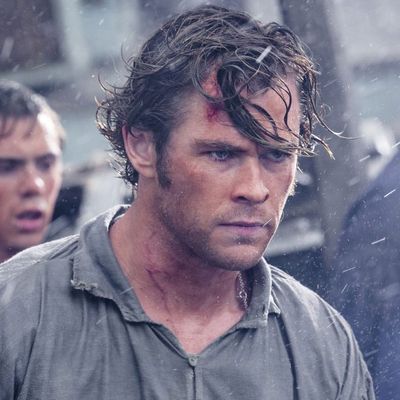
“How does one come to know the unknowable?” are the words that begin Ron Howard’s In the Heart of the Sea, and one wishes the film itself genuinely explored that question instead of merely paying lip service to it. The film is an adaptation of Nathaniel Philbrick’s best-selling book about the 1820 tragedy of the whaling ship Essex, which reportedly inspired Herman Melville to write Moby Dick. Hence, the script’s odd framing device, in which Melville (played by Ben Whishaw) tracks down an aging, haunted sailor named Tom Nickerson (Brendan Gleeson), who served as a young crewman on the doomed ship. Nickerson then tells his tale … which focuses mostly on the ship’s first mate Owen Chase (Chris Hemsworth). In other words, Melville narrates a story in which Nickerson narrates a story about Chase. You’d think these nesting framing devices would lead to some kind of deep perceptual insight, but no; one suspects they’re there mainly to justify the Moby Dick connection and to get us to Chris Hemsworth, leading man.
But what a leading man he makes, brawny and bold and blond and fair. The Viking-like Hemsworth is well-cast as a veteran Nantucket whaler who seeks to command his own ship, but whose lowly origins keep him down. Instead, Chase is hired as first mate to serve under the less experienced, patrician Captain George Holland (Benjamin Walker), scion of a well-established whaling family. (“Blood will always win out!” Chase is told, in no uncertain terms.) The two men don’t hit it off – first mates and captains rarely do, in the movies at least – but their conflict doesn’t so much inform the plot as just keep things busy until the whales show up.
In the Heart of the Sea goes from being a stand-off between dueling officers, to a whaling yarn, to a survival tale. The whaling sequences probably work best, in part because that’s where the film is most heavily invested. Howard seems less interested in the men than in the machinery and the viscera – the ropes, bolts, and harpoons, and the fat, the entrails, the blood. Even the sickly pallor of Anthony Dod Mantle’s processed-looking color photography works here. This might be the first film I’ve ever seen where I couldn’t decide if the cinematography was outlandishly beautiful or outlandishly ugly; but in these whaling sequences, the difference sort of doesn’t matter.
The materialist filmmaking also makes some thematic sense in the first half. Early scenes on Nantucket portray whaling as a bustling, high-stakes industry — the connections with the modern oil business are overt – in which every ounce of whale fat has value, and every piece of equipment has a cost. So when the men of the Essex, after months out at sea, finally spot a pack of whales blowing out at sea, one initially feels a certain sense of relief. But a passage that begins in excitement and triumph ends in melancholy grotesquerie. The men head out in daylight to capture a sperm whale, and are surrounded by leaping, shiny dolphins; later, as they cut the whale’s carcass up at night, they’re surrounded by hungry sharks snapping at the entrails and at the boiling cauldrons of whale oil. It’s as if the ship has passed some sort of threshold into hell.
Sure enough, a reckoning soon comes, courtesy of a massive, relentless whale — its whitish body pockmarked and deeply scarred, giving it the aura of an avenging demon. This, and what follows, is perhaps “the unknowable” we heard so much about earlier. But the meat-and-potatoes Howard is uncomfortable in the realm of the spirit, or the metaphysical. He can film objects, and he can film people, but he can’t quite film emptiness. The cosmic vastness of the sea eludes him. As does the horror of what the men have to endure. He wants to rub our faces in it, but he’s not the kind of director to go dark like that.
All this is given a further cruel irony by the narrative presence of Melville, that great poet of the sea and of the material-made-abstract; the film fails to show us the very thing that it contends the author himself learned from the tale of the Essex. It also doesn’t help that the script hasn’t done the necessary work of giving life to the many faces on the ship. Hemsworth is his usual likable self, but any other character details we get feel rudimentary and trite. Since a survival tale is mostly worthless if you don’t care about any of the people trying to survive, the air gets drained from the movie. In the Heart of the Sea isn’t a bad film, necessarily. It has some genuinely effective passages in its first half, and Howard is nothing if not a dutiful, check-the-boxes kind of director. But a story like this – one of horror and madness, which helped give birth to an ornate masterpiece of obsession – needs to go a little crazy. And this director doesn’t do crazy.





